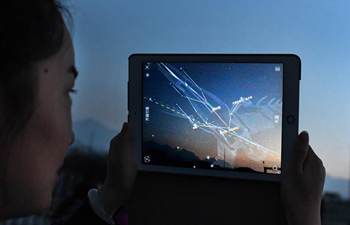LONDON, Aug. 14 (Xinhua) -- A new ultra lightweight wireless sensor system could improve the way that brain activity data is collected in mice, which could advance dementia and brain research, according to a study released Monday by the Imperial College London.
Electroencephalogram (EEG) recordings are typically conducted in mice to understand neural activity and how it relates to specific behaviors or cognitive tasks such as memory, learning and decision-making.
These studies are relevant for understanding brain disorders like schizophrenia and Alzheimer's disease, and typically involve the use of wireless recording devices on the mouse's head. But conventional technologies are heavy for the mice to carry and have limited battery life.
The sensor system, called TaiNi, has been developed by engineers at Imperial College London in collaboration with the pharmaceutical company Eli Lilly, in their UK research labs.
The wireless low power device weighs just 1.5 grams, and it is capable of 72 hours recording from 16 channels and of capturing all types of neural activity from mice performing a range of tasks in a variety of environments.
TaiNi can also monitor networks of individual neurons in the brain. This greatly increases the amount of information gathered from each mouse every time a recording is made.
"Animal research is absolutely vital if we are to solve the world's most pressing health challenges. At the same time, constantly improving the welfare of the animals that make life-saving research possible is absolutely essential and it is something that the UK research community is working hard to do," said study author Professor Esther Rodriguez-Villegas from Imperial College London.
The study has been published in the journal Scientific Reports.

















